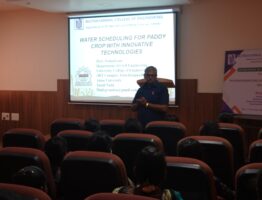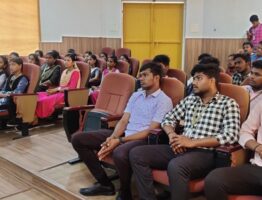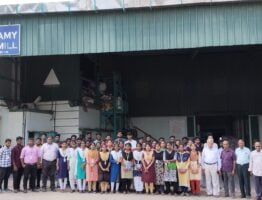Overview
The Department of Agricultural Engineering commenced from the academic year 2019-20 with a vision to mould our students as a strong professional engineers, since agriculture is the backbone of our nation. The Department is established to develop water resource system. Our department is equipped with state-of-the art laboratory facilities with highly qualified members of faculty. The department offers B.Tech. Agricultural Engineering, focusing on enhancing the practical knowledge of the students, thus professionals with the knowledge of modern farming and irrigation and encouraging them to solve different practical difficulties in small-landholdings. Our Department is spreading its wing by establishing various laboratories like Farm Machinery and Power, Agro-meteorological Observatory, Irrigation Field Laboratory, Food Process Engineering Lab, Soil and Water Conservation Engineering Lab, Agricultural Processing Lab, Bio-energy Lab, Post Harvest Engineering Lab etc in order to meet the requirements of the Degree Program. To provide adequate farming skill as a background for Agricultural Engineers, 5 acre farm land is allotted for Crop Husbandry Lab. Students are being trained in crop cultivation techniques from land preparation to harvesting of crops like wet land crop and Irrigated Dry land crops. The various software for Mapping, modeling and analysis in CAD, GIS and remote sensing are being equipped in the department MoUs with various industries such as Agricultural Machinery and Irrigation are signed to empower students through on-site training programs and internship. In order to bridge the gap between the industrial practices and academics, a higher level of exposure to the industries are given to the students there by enabling them to be successful social entrepreneurs.
Vision
To train and empower the students towards Agricultural Engineering profession with a wealth of knowledge and function effectively in disciplines like agricultural machinery and automated machine systems, soil conservation, irrigation and drainage, crop nutrient and fustigation, postharvest handling and value addition, farm animals and housing etc. for the efficient production and processing of food, feed, fibre and fuels.
MISSION
- To develop skills on the various aspects of Agricultural Engineering to make graduates become into entrepreneurs, scientists, academicians and technologists for sustained food production to meet the ever-increasing population’s food needs.
- To strengthen the research activities are in Agricultural Engineering by proposing innovative and application-oriented projects for the development of agriculture and allied sectors.
- To establish the necessary infrastructure to meet the industrial, and Development needs.
Programmes
- B.Tech. – Agricultural Engineering
Program Educational Objectives
PEO1: Foundation:
To train and educate students with general knowledge and skills in agricultural water management, agricultural production process, farm machinery and farm management.
PEO2: Analytical Skill:
To provide a sound theoretical knowledge in Engineering principles applied to agriculture.
PEO3: Leadership Skill:
To prepare students for a successful Agricultural Engineering career integrating all aspects of engineering in agriculture.
PEO4: Employability Skill:
To develop innovative capacity of students for increasing Agricultural production with scarce water resources available.
PEO5: Responsible :
To impart positive and responsive out-reach attitudes, initiative and creative thinking in their mission as engineers.
PEO6: Other Skills:
To understand ethical issues and responsibility of serving the society and the environment at large.
Program Outcomes
Graduates of Agricultural Engineering will have
1. Engineering Knowledge
Ability to apply the knowledge of mathematics, science and engineering in agriculture.
2. Problem Analysis
Ability to design and conduct experiments, analyze and interpret data to prepare farm specific report.
3. Design/development of solutions
Ability to design an irrigation system to meet the desired needs within realistic constraints such as economic, environmental, social, political, ethical, and sustainability.
4. Conduct investigations of complex problems
Ability to think creatively, to formulate problem statements, to communicate effectively, to synthesize information, and to evaluate agricultural systems.
5. Modern Tool usage
Ability to function in interdisciplinary teams within the Institute and also with other organizations at National/ International level while planning the research projects.
6. The Engineer and Society
Ability to use the techniques, skills and modern engineering tools necessary for Agricultural engineering practice.
7. Environment and Sustainability
Ability to develop competencies in computer and automatic control systems, information systems, mechanical systems, natural resource systems to solve engineering problems.
8. Individual and Team work
Ability to express them clearly in oral and verbal communication needs.
9. Communication
Ability to devise a strategy or action plan to utilize the acquired knowledge in increasing water- use efficiency, farm mechanization and Post-harvest technology etc.
10. Project management and finance
Capability to self-educate in emerging problems and understand the value of lifelong learning in Food Technology, Farm Machinery and Food Processing.
Program Specific Outcomes
PSO1: Professional Skill Development
To ensure education necessary to understand Agricultural Engineering solutions in global and social context.
PSO2: Analytical Skill and Problem Solving Expertise
To have the ability to solve complex problems related to farm mechanization, soil and water conservation, post-harvest technology, renewable and non-renewable resource technologies, landscape architecture and modern irrigation techniques.
PSO3: Career and entrepreneurship skill
Understanding the social awareness and environment necessity along with ethical responsibility to have a successful career and to have a zeal for real world application using optimum resource and to become an entrepreneur.
 Overview
Overview Vision
Vision MISSION
MISSION


































































